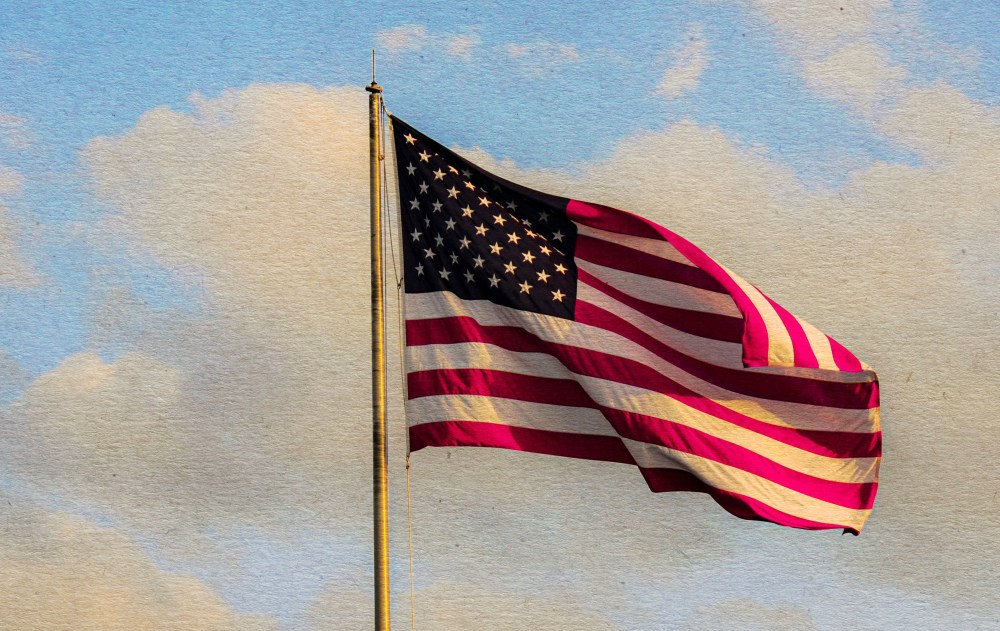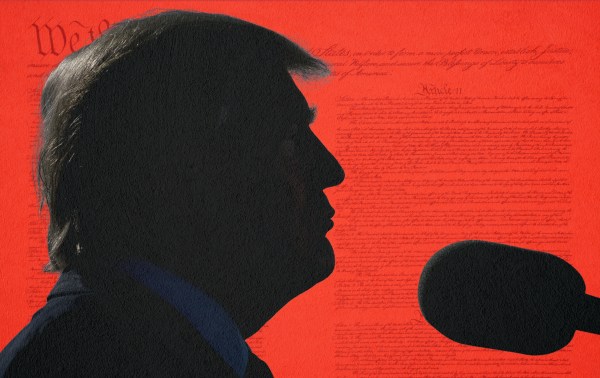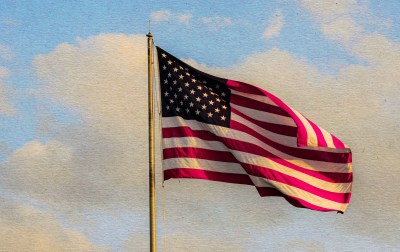Dear Reader (including those of you who make outdated fashion choices),
Question: What principle do you hold that is against your self-interest or political desires? Don’t answer right away. Think about it for a minute.
While you’re doing that, I’ll keep typing.
Around 20 years ago, a bunch of libertarians—led by my friends Nick Gillespie and Matt Welch, as well as Brink Lindsey and the late David Boaz and a few others—advanced the argument that America was much more libertarian than the conventional wisdom held and that, even better, libertarianism was about to have its big “moment.” Libertarians weren’t fringe, they claimed, they were the center of American politics, a crucial swing vote, etc. And they were about to triumph.
I was skeptical of all this at the time. My view then, and now, was that Americans are libertarian, or simply freedom-loving, only about the things they’re libertarian about, and they’re not about the rest. In other words, the freedoms we want are the freedoms we think we should have. But the freedoms we don’t want, or care much about, or—crucially—don’t want others to have, we’re okay with the state regulating or prohibiting.
David French often makes this point about free speech. Everyone is for free speech that they think should be free. But lots of people are opposed to free speech when they don’t like what’s being said. The real free-speech absolutists are a very small slice of the public. But because we live in a very polarized and partisan country, the free-speech absolutists will often have half the country on their side on any specific controversy. This is the fraught space groups like the Foundation for Individual Rights and Expression, known as FIRE, live in. When the people at FIRE are defending college professors from Woke Torquemadas, the left hates them and the right loves them. When they’re defending college drag shows, the right hates them and the left loves them.
Some people are super libertarian on issues relating to sex or drugs, but are decidedly un-libertarian on guns or economics. There’s a certain kind of left-libertarian that is quite passionate about, say, gay marriage, but the same cultural convictions that lead them to say that the state should “stay out of the bedroom” also drive them to believe that the state should intrude on the bake shop and force a baker to make a wedding cake for a gay couple.
A message from The Dispatch
The American experiment is still happening.
As the United States approaches its semiquincentennial, The Dispatch has launched The Next 250—a year-long project examining America’s founding principles and what makes this country, imperfect though it may be, so exceptional. Featuring exclusive essays from historians, political theorists, military experts, legal scholars, and cultural commentators, we’re exploring the biggest questions facing our nation and the unique qualities of this big, messy experiment we call home.
And Lord knows there’s no shortage of people on the right who are intensely passionate about religious freedom—for Christians and, usually, Jews—but have, shall we say, more nuanced views about Muslims. And don’t get me started on all the people who insist they are passionate and consistent devotees of the free market who have no problem with tariffs and industrial policy.
My point isn’t about inconsistency or hypocrisy—though there’s no shortage of that these days. Before I get to it, let’s go back to libertarianism. What’s the opposite of libertarian? Authoritarian? Statist? Sometimes. If people are libertarian about the things they are libertarian about, that means they are un-libertarian about the things they’re not libertarian about (tautologies are fun!).
While there will always be libertarians who think any infringement on liberty is an outrage, the truth is that sometimes being un-libertarian is just called “governing” or even “democracy.” Some town that democratically decides to ban booze, or require businesses to be closed on Sundays, or ban the sale of porn magazines (assuming they still exist) is un-libertarian, but that doesn’t make it Nazi Germany or the Republic of Gilead.
But it’s definitely true that authoritarianism or statism (pick your own -ism, it don’t cost nothing) works the same way as libertarianism does. Let’s just call it authoritarianism for simplicity’s sake. A lot of people who claim to hate authoritarianism are actually fine with authoritarianism they agree with. When Barack Obama said he couldn’t do DACA because—his words—“I’m not a king” and “I’m not an emperor”, a lot of his fans nodded along. Then he did DACA anyway, and the same fans cheered that the president was—on his own terms—behaving like a king or emperor.
Joe Biden repeatedly tried to do stuff that can fairly—if not always dispositively—be described as lawless and unconstitutional—the rent moratorium, student debt forgiveness, hiking the minimum wage for federal contractors, censoring online speech, etc. (I’d throw in some of his pardons). The same crowd that is wildly—and often correctly—outraged by Donald Trump’s violations of law and the Constitution was remarkably silent about all of that.
And, of course, the vice versa is breathtaking. Those outraged at Biden’s (and Obama’s) constitutional and legal excesses are whistling zip-a-dee-doo-dah out of their sphincters at Trump’s myriad transgressions. I can count on two hands the number of prominent conservatives who’ve complained about Trump’s flatly illegal refusal to ban or sell TikTok and still have several fingers left over.
The loud right that spent years worrying about Obama or Biden using FEMA camps to round up Christians or patriots seems absolutely giddy about Trump using the National Guard in American cities. And please don’t bleat at me about the “Biden crime family” if you’re not willing to raise an eyebrow at the Mar-a-Lago mob.
America’s liberal culture.
But as seductive as the hypocrisy policing is to my pundit’s soul, that’s still not my point.
In my eggheadier squabbles with illiberals to the left and the right of me, I keep emphasizing that America has a “liberal” culture. Again: I don’t mean “progressive” or some other flavor of left-wing. And I don’t mean that Americans go around asking, “What would John Locke do?” or “What would Adam Smith think?” In a country where barely half the people can name one of the rights protected in the First Amendment and a quarter can’t name a single branch of government, I don’t have a lot of faith in their ability to quote Madison, Montesquieu, or Mill.
But Americans know they have rights. Americans value freedom—a lot. When the government—state, local, or federal—does something painfully stupid or needlessly bureaucratic or oppressive, Americans say, “I thought this was America.” That sentiment is a better measure of America’s Americanness than any bundle of ideas found in any book.
Indeed, for as much as conservatives love to talk about how the left is Marxist or socialist or totalitarian, a lot of issues on the left are still about freedom, rights, and opposition to the state.
Defunding the police or getting rid of prisons may be an astoundingly idiotic idea, but it’s also very libertarian—or anarchist, if you prefer—when you think about it. Believing that homeless people and drug addicts should be able to pitch a tent where they please in public spaces is also a terrible idea, but it’s hardly statist. Proponents of abortion rights argue their case from a position of individualism, autonomy, and in opposition to state (or church) intervention. That’s very liberal.
Support for drug legalization cuts across the ideological landscape, but it doesn’t cease to be libertarian when it moves left of center. Decriminalizing prostitution, open borders, trans rights, opposition to the death penalty: these are all more anti-statist or libertarian positions than most people on the right tend to acknowledge. (And, yes, I know it gets messy because they often want to use the state to enforce these things, sometimes to the detriment of other people’s rights or liberties). It was only when people like Jonathan Rauch and Andrew Sullivan started making a basically conservative, anti-statist argument for gay marriage that mainstream Americans started buying into it.
Of course, the left is more enamored with positive liberties and positive rights—i.e., stuff the government gives you (or, in their view, should give you) like health care, housing, or jobs. FDR had the classic expression of this view in his so-called Second Bill of Rights: “Necessitous men are not free men.” I loathe FDR’s Second Bill of Rights, but he obviously had something of a point. I just think the market is much better than the government at conquering the necessitousness he had in mind. But that’s an argument for another day.
What gets overlooked is that to the degree such arguments find traction with Americans, they do so by using the language of liberty and rights. I still chuckle at Nancy Pelosi and other Dems arguing that Obamacare would be awesome because it would mean the end of “job lock.” Not being stuck to your job for your health care would mean you could follow your passions and do things like “write poetry,” Pelosi promised. I haven’t checked with the Bureau of Labor Statistics on the increase of professional poets over the last decade. But I’m sure that if a surge in professional peddlers of iambic pentameter could be credited to Donald Trump, the new BLS chief will find it.
Still, she was appealing to what Americans value: personal autonomy and freedom. I think Zohan Mamdani’s ideas about economics are embarrassingly retrograde and ridiculous. But they appeal to a lot of people who rightly feel like economic mobility is vanishing. Mobility—the ability to move to a better job, home, or way of life—is a deeply held desire in American culture.
The right’s commitments to freedom and rights—at least rhetorically—are more familiar because the right’s vocabulary has always been more forthrightly anti-statist and laden with Constitution-speak. That rhetoric is ripe for more hypocrisy point-scoring these days, but let’s just stipulate that I checked that box (again).
The right is also more open in its support for order. This is getting too long, and order is an even trickier concept for a lot of folks. But liberalism—philosophically and culturally, though not necessarily in the same ways—is about order every bit as much as it is about freedom. Its detractors on the left and the right have trouble seeing that. The left listens to the right’s talk about order and hears tyranny or some kind of reactionary oppression (“We won’t go back!” and all that stuff). The right listens to the left’s talk about order and hears socialism, or social engineering, or thought policing.
And this gets me, finally, to my point. People love to say “politics is downstream of culture,” but they rarely mean it in the way it is most fundamentally true. They usually say it in culture war controversies about some movie or song. That’s fine. But the real meat on the bone of that phrase is that Americans are different. American exceptionalism is very real, with deep roots in English exceptionalism. You can trace America’s ornery opposition to government meddling in our lives to feudal complaints about William the Conqueror and the Norman yoke.
American politics isn’t so much “downstream” of culture as they are an ecosystem that lives off the groundwater that is our culture.
The polarization and partisanship that so defines our politics these days is less about “true Americans” versus “anti-Americans” than it is a function of the fact that Americans refuse to see the Americanness of their fellow Americans.
I love ideological arguments. I’ve spent my entire professional life having them. But the problem with today’s ideological arguments has less to do with the actual ideologies and more to do with the partisan and tribal passions that start from the premise that America is defined by our politics and, therefore, the people with the wrong politics are not Americans.
Don’t get me wrong, I think there is a ton of un-American and anti-American stuff in our politics these days. But America is about more than its politics. Moreover, our crappy politics is driven by an inability to see that American culture is broader, deeper, and more widely shared than our political leaders and their shock troops can see, never mind acknowledge. The idea that if the other side is in power it will spell the end of America is a kind of anti-Americanism because it assumes that America is defined by its politics the way some feudal society is defined by its king, and therefore America is good or bad or “over” if the wrong political actors are in charge. And that heinous idea encourages whichever party is in power at a given moment to do heinous things.
When Obama was elected, the left believed his absurd rhetoric about fundamental transformation—and so did the right. The left loved it. The right hated it. The same dynamic is now at play in reverse with Trump.
There’s always a lot of ruin in a nation, but America can survive bad political leaders because America is about more than its government at any given moment.
I ended up writing about something a little different than I intended when I asked that question at the beginning. But I think it’s still worth returning to. The question was initially intended to develop an argument about how ideological commitments aren’t really commitments if you only follow them when they’re in your political interest. You can’t call yourself a free speech defender if you only defend the speech you agree with. You can’t be a defender of free markets only when the other team is statist or if you become statist when it’s in your political interest.
But there’s a broader way to think about this.
The only way our system can continue to work is if people—not just politicians, but everyone—are willing to adhere to some rules even when they can get away with breaking them for their own benefit. This is true at every level of society, from marriage and family, to friendships, business, sports, journalism, and pretty much everything else you can think of. But especially, or at least most relevantly, politics. During various political controversies about abuses of power, I’ve often asked some version of “How would you feel if Democrats did this when they’re in power?” to Republicans and vice versa to Democrats.
But a better version of this question might be “How would you feel about America if the other side did this?” And, if your answer is different, that’s a problem. Republicans need to recognize that non-Republicans are Americans, too. And vice versa.
Various & Sundry
Canine Update: Before I get into it. There’s been an uptick in people writing me to say how they don’t care about my dogs and think it’s very stupid or offensive or a waste of their time that I provide the Canine Update or tweet about my dogs. Just to be clear: I don’t care. I’m going to keep doing it. But I find it an absolute mystery that people can’t make it to the end of one of these “news”letters and think it was a worthwhile use of their time and then get enraged by a paragraph about my animals. Few things in life are easier than not reading the Canine Update if you don’t want to. If you find yourself screaming, “My eyes! I read about some dogs!” that’s a you problem. I bring this up for two reasons: To tell you to stop protesting, because that’s a real waste of your time and mine. And, yes, I think less of you for being so upset about this.
Okay, so Zoë has definitely recovered. Though everyone seems to be showing their age more and more, which makes me a little misty-eyed. A bunch of folks on Twitter were stunned to learn that Pippa is 11 years old (so is Zoe). Gracie is like 17. They’ve all lost some of their pep. Zoë prefers to glare at vermin rather than dispatch them to hell. Gracie, who once accompanied me and Cosmo the Wonderdog (his memory is a blessing) on neighborhood walks, now mostly stays close to home (though partly because Chester circles the house so much he might as well have a shark fin) and has gotten ever more demanding for love-on-demand. Pippa prefers to carry her ball more than chase it and she’s grown quite fond of applying her years of experience to expert level napping. Indeed, she’s so fond of sleeping in I basically need Zoë to convince her to go out most mornings. After a brief and historically unusual spell of nice weather in early August, it’s now back to the traditional equatorial dankness. Our air conditioning is running so hard that some of our windows sweat like Barton Fink’s hotel room walls. Still, the girls like their adventures, and Pippa enjoys logging on with Clover. And speaking of spaniels. There’s a house in our neighborhood with an excellent one who likes to escape and visit us (word has gotten out that TFJ is a soft touch). Zoë and Pippa are less thrilled by such visitors.
Oh, and the Eye of Fafoon is still upon you.
The Dispawtch

Owner’s Name: Joel Stewart
Why I’m a Dispatch Member: I was a loyal Remnant listener who became a Dispatch free-loader, but the mission and content were such that I felt I needed to do my part. The right-wing sites I frequented as a younger man all lost their collective minds, and the mainstream media continues to disappoint. The Dispatch has become my safe haven for sane political analysis, and The Morning Dispatch is one of the first things I read every day.
Personal Details: I’m a pastor, small business owner, chicken farmer, and outdoorsman with a long-suffering wife and four great kids in Guthrie, Oklahoma.
Pet’s Name: Dolly (left) and Luther (right)
Pet’s Breed: Dolly is a black-mouth cur/Border Collie, and Luther is black-mouth cur/Catahoula.
Pet’s Age: Dolly is 2.5, Luther is 1.
Gotcha Story: I was helping a friend on his cattle ranch when we happened to walk by an empty horse trailer, where one puppy sat in a pile of hay. My friend asked if I wanted a puppy, but I declined. I did, however, take a picture, and by the end of the two-hour drive home I had decided I needed that little cow dog. Dolly became a treasured part of our family, so when I found out that she had a little half-brother a year later, I couldn't help picking him up from the ranch.
Pet’s Likes: Dolly: gunfire and fireworks, BBQ raccoon, and her adopted kitten. Luther: defending his family from dangerous poultry that escape containment, BBQ raccoon, and playing in the sprinkler.
Pet’s Dislikes: Dolly: other dogs, large birds that swoop too low over her turf, chickens. Luther: gunfire and fireworks (the Fourth of July is dramatic for our dogs, for different reasons), and sometimes Tina, our barn cat.
Pet’s Proudest Moment: Dolly: alerting me to a baby rattlesnake that was inches from my bare feet. Luther: His recent possum annihilation campaign has been a source of great pride (and his first measurable contribution around here).
Bad Pet: Dolly: when she bumped off half of our guinea flock. (Turns out she just got tired of them before I did. The rest were sold. SO LOUD.) Luther: when he kicked off Thanksgiving early by killing the turkey … in August. He has committed many more other crimes against our poultry, shoes, and garden hoses, but that was his worst.
Do you have a quadruped you’d like to nominate for Dispawtcher of the Week and catapult to stardom? Let us know about your pet by clicking here. Reminder: You must be a Dispatch member to participate.








Please note that we at The Dispatch hold ourselves, our work, and our commenters to a higher standard than other places on the internet. We welcome comments that foster genuine debate or discussion—including comments critical of us or our work—but responses that include ad hominem attacks on fellow Dispatch members or are intended to stoke fear and anger may be moderated.
With your membership, you only have the ability to comment on The Morning Dispatch articles. Consider upgrading to join the conversation everywhere.